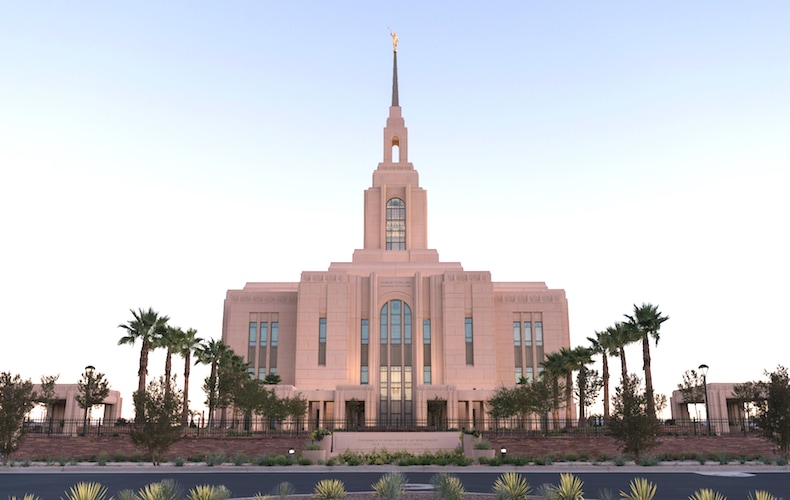Nearly four months after rededicating its oldest temple in Utah, The Church of Jesus Christ of Latter-day Saints dedicated its newest temple Sunday a mere four miles away.
Apostle Henry B. Eyring, second counselor in the faith’s governing First Presidency, offered the dedicatory prayer, making the single-spired, three-story, 96,277-square-foot Red Cliffs Temple operational.

(The Church of Jesus Christ of Latter-day Saints) The Red Cliffs Temple in St. George.
Fellow apostle Jeffrey R. Holland did the honors back in early December at the nearby St. George Temple, originally completed in 1877 and recently reopened after undergoing nearly four years of renovations.
The sparkling new Red Cliffs Temple, with its coral-beige facade blending with southern Utah’s redrock resplendence, and its pioneer-era cousin, with its red sandstone exterior plastered over in glistening white, make St. George (population 102,000) the fourth city in the world (after South Jordan, Provo and Lima, Peru) to have two Latter-day Saint temples.
“My faith is strengthened whenever I come to this area,” Eyring said in a news release. “This ground was made sacred to my family and to me by the faith of ancestors now in the spirit world. Their faith in God, in temples, and in prophets carried them through the difficult times that come into every life. My great-grandfather, Henry Eyring, was one of the pioneers of the St. George area. He served as a recorder in the St. George Utah Temple. I can only imagine his joy to know that there is now a second temple in St. George.”
(The Church of Jesus Christ of Latter-day Saints) Alexis Schmitt, left, and her husband, general authority Seventy Jonathan Schmitt; Jennifer Kearon, and her husband, apostle Patrick Kearon; President Henry B. Eyring, second counselor in the First Presidency; and general authority Seventy Kevin W. Pearson, Utah Area president, and his wife, June, at the dedication of the Red Cliffs Temple.
In his dedicatory prayer, Eyring, accompanied by recently ordained apostle Patrick Kearon, petitioned the heavens that the church’s newest temple “may be ever sacred to those who enter it and to all who look upon it.”
With the addition of Red Cliffs, Utah is home to 17 functioning temples: Bountiful, Brigham City, Cedar City, Draper, Jordan River (South Jordan), Logan, Monticello, Mount Timpanogos (American Fork), Ogden, Orem, Oquirrh Mountain (South Jordan), Payson, Provo City Center (converted from the former Provo Tabernacle), Saratoga Springs, St. George and Vernal.
(The Church of Jesus Christ of Latter-day Saints) The lobby in the Red Cliffs Utah Temple.
The Space Age Provo Temple shut down Feb. 24 to be demolished and rebuilt. It will reopen with a new look and a new name: the Provo Rock Canyon Temple.
An open house is underway at the historic Manti Temple, which will be rededicated April 21. Two other new Utah temples are scheduled to be dedicated in June — the Taylorsville Temple on June 2; and the Layton Temple on June 16.
(The Church of Jesus Christ of Latter-day Saints) The Manti Utah Temple is one of 28 existing and planned temples in the Beehive State, home to more than 2 million Latter-day Saints.
The iconic, six-spired Salt Lake Temple is undergoing renovation and a seismic retrofit. At last word, it is expected to open its doors to the general public in 2026 for the first time since just before its 1893 dedication.
Six more — Deseret Peak (Tooele), Ephraim, Heber Valley, Lindon, Smithfield and Syracuse — are either under construction or in planning stages.
If tradition holds, the global faith of 17 million members will announce new temples at its April 6-7 General Conference, though it has been more than two years since any more have been added to the Beehive State’s tally of 28 existing or planned temples.
Latter-day Saints view these buildings as houses of the Lord and, unlike their more common meetinghouses, places where faithful members participate in their highest religious rites such as eternal marriage.








